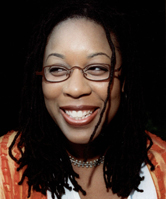Erica Simone Turnipseed Gets Real With Her Fiction
Erica Simone Turnipseed recently published Hunger, the sequel to her first novel, A Love Noire. Both books work to ground the relationship between the central characters by placing them in a world recognizable as our own, even to the extent of drawing from recent events. Here, Turnipseed explains why she chooses to embrace the responsibility of getting public stories right in order to tell her own.

The phrase “truth is stranger than fiction” is ubiquitous, at least in English. We often utter it when watching the evening news as some sort of explanatory statement that helps us process the world’s endless parade of madness and sadness, whether man-made or the proverbial act of God. As a fiction writer, I am clear about two things: that the stuff of fiction can be pretty strange, and that fictionalized human drama must ring with authenticity in order for the reader to believe it.
For me, my characters are real: they have a history, a dysfunctional family, favorite haunts, and people who care for them, not least of which is me. When I wrote A Love Noire, and gave birth to the characters of Innocent and Noire, I learned just how real these characters had become: My inbox was full of emails from readers who confessed that they knew Noire, the Afro-wearing Ph.D. student, and her love interest Innocent, a well-heeled investment banker who hailed from Côte d’Ivoire, West Africa. Not only did they know these characters, but many proclaimed that they were these characters! Fictionalized or not, Noire and Innocent—and their family, friends, and colleagues—were real to many.
It was in A Love Noire that I decided to make their universe parallel our own: they lived on real streets in New York City and traveled to historical sites in New Orleans, Charleston, Jamaica, and Côte d’Ivoire. They shared a penchant for the music, clothing, and restaurants of many of the trendy sorts here on our side of planet Earth.
But those things were simple. It gets harder when characters are affected by the incidences of recent history. In most historical fiction, writers can create a plausible, historically accurate story line for their characters knowing that their readers are unlikely to have a personal association with the events. It was quite the opposite when I wrote about the Christmas Eve coup in Côte d’Ivoire as experienced by Innocent and his family: some of my readers had first-hand accounts of it as well.
So I, as the writer, must be as sensitive to the feelings of the reader as I am to the facts. I was keenly aware of this as I approached the writing of Hunger. In this, my latest novel, I’ve brought Noire and Innocent back in a post-9/11 world, beginning with each character’s experience of that day: Noire on a return flight from Haiti back to the U.S. where she’s been conducting research for a year, and Innocent departing the World Trade Center just minutes ahead of the attack. Additionally, only a few chapters later, someone close to Noire is lost in the November 12, 2001 crash of American Airlines flight 587 in Queens, New York that was bound for the Dominican Republic.
My editor initially said that the opening chapters of Hunger had too much tragedy, loss, and sadness for the reader. But those things did happen. I named part one of the novel “Stranger Than Fiction” in deference to those people on the frontlines of these international tragedies, and to acknowledge that I was asking a lot of my readers. I understand that for many of us, the wounds are still fresh. I took the risk of exploring these events in my writing out of what was, for me, a call to tell an authentic story featuring faces seldom seen.
Indeed, at my book reading held two days after the fifth anniversary of September 11th, two audience members described escaping the World Trade Center with their lives and one had lost a loved one at the restaurant atop the towers, Windows on the World. It was humbling to have them share their first-hand accounts, and gratifying that my book had provided them the platform. Both were African-American, as was a majority of the audience, and they thanked me for placing our face in the midst of the tragedy that day.
As a writer, that’s my most rewarding moment: when my fiction gives people a space to process and begin to heal from the harsh facts of our lived lives.
1 November 2006 | guest authors |

 Our Endless and Proper Work is my new book with Belt Publishing about starting (and sticking to) a productive writing practice.
Our Endless and Proper Work is my new book with Belt Publishing about starting (and sticking to) a productive writing practice. 
